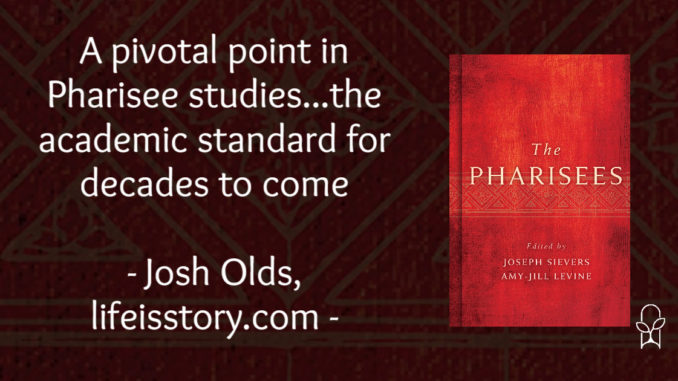
Published by Eerdmans on December 2, 2021
Genres: Academic, Non-Fiction
Buy on Amazon
Goodreads

A multidisciplinary appraisal of the Pharisees: who they were, what they taught, and how they’ve been understood and depicted throughout history
For centuries, Pharisees have been well known but little understood—due at least in part to their outsized role in the Christian imagination arising from select negative stereotypes based in part on the Gospels. Yet historians see Pharisees as respected teachers and forward-thinking innovators who helped make the Jewish tradition more adaptable to changing circumstances and more egalitarian in practice. Seeking to bridge this gap, the contributors to this volume provide a multidisciplinary appraisal of who the Pharisees actually were, what they believed and taught, and how they have been depicted throughout history.
The topics explored within this authoritative resource include:
the origins of the Phariseesthe meaning of the name “Pharisee”Pharisaic leniency, relative to the temple priesthood, in judicial mattersPharisaic concerns for the Jewish laityPharisaic purity practices and why they became popularthe varying depictions of Pharisaic practices and beliefs in the New TestamentJesus’s relationship to the Phariseesthe apostle Paul and his situation within the Pharisaic traditionthe question of continuity between the Pharisaic tradition and Rabbinic Judaismthe reception history of the Pharisees, including among the rabbis, the church fathers, Rashi, Maimonides, Luther, and Calvinthe failures of past scholarship to deal justly with the Phariseesthe representations, both positive and negative, of the Pharisees in art, film, passion plays, and Christian educational resourceshow Christian leaders can and should address the Pharisees in sermons and in Bible studiesFollowing the exploration of these and other topics by a team of internationally renowned scholars, this volume concludes with an address by Pope Francis on correcting the negative stereotypes of Pharisees that have led to antisemitic prejudices and finding resources that “will positively contribute to the relationship between Jews and Christians, in view of an ever more profound and fraternal dialogue.”
Contributors:
Luca Angelelli, Harold W. Attridge, Vasile Babota, Shaye J. D. Cohen, Philip A. Cunningham, Deborah Forger, Paula Fredriksen, Yair Furstenburg, Massimo Grilli, Susannah Heschel, Angela La Delfa, Amy-Jill Levine, Hermut Löhr, Steve Mason, Eric M. Meyers, Craig E. Morrison, Vered Noam, Henry Pattarumadathil, Adele Reinhartz, Jens Schröter, Joseph Sievers, Matthias Skeb, Abraham Skorka, Günter Stemberger, Christian Stückl, Adela Yarbro Collins, and Randall Zachman.
In typical Christian interpretation, if the Gospels had an overarching villain it wouldn’t be the Herods or the Caesars or even the Sanhedrin—it would be The Pharisees. Throughout history, the Pharisees have been much maligned and misunderstood. Even today, the use of their name is almost a slur for someone who is self-righteous or hypocritical. This unfair characterization comes from a lack of contextualization. We really only know the Pharisees in terms of their opposition to Jesus, but they are much more than that. In this volume, Joseph Sievers and Amy-Jill Levine guide readers through a cadre of Ancient Near Eastern experts to examine the history of the Pharisees, their beliefs, their reception, and how we must move into the future.
Sievers and Levine are both experts in Jewish history. Father Sievers is a Catholic priest and professor of Jewish history and literature in Pontifical Biblical Institute. Dr. Levine is an Orthodox Jew whose professional legacy has been unraveling the complex and messy history between Christianity and Judaism. She has a Ph.D. from Duke, has been a professor of New Testament, and is the Chair of Jewish Studies Emerita at Vanderbilt. Basically, you couldn’t ask for a more thoroughly knowledgeable editing duo. Joining them are experts too numerous in fields from theology, New Testament studies, history, rabbinic literature, archaeology, Jewish studies, patristic theology, Jewish law, and more. It’s a more than competent collection of scholars each penning a chapter that lies squarely within their academic expertise.
The Pharisees is divided into four parts: the prelude, a historical reconstruction of the Pharisees, the reception of the Pharisees throughout history, a conclusion that looks at how we should teach and preach about the Pharisees today. This is a highly academic work, but carries with it some excellent applicational value. Craig Morrison’s opening essay on interpreting the name “Pharisee” highlights just how much we don’t know and how complex and incomplete the history of the Pharisees actually is. A good portion of the historical reconstruction looks at the Pharisees in light of the Gospels and Paul, helping pastors more accurately exegete those pertinent passages. AJ Levine concludes the book with a chapter on preach and teaching the Pharisees that wonderfully brings the whole book into pastoral context and begs the reader not to paint the Pharisees as villains or use the terms a slur for legalistic or hypocritical individuals.
The historical reconstruction, with its theological overtones, was the strength of the book for me. The authors really helped me gain the knowledge and nuance needed to understand the Pharisee’s context within the story of Jesus, even when I did not necessarily agree with their theological interpretations. The chapters on the historical reception of the Pharisees make sense of how the Pharisees became the stereotyped villains in today’ typical theology. The authors there are able to show how this isn’t really a fair characteristic and, most importantly, point out the harm that was done to Jewish people as a result. Rabbinic Judaism is, in many ways, the successor to the Pharisees, and Orthodox Judaism and the successor to that—which means that we should be very careful in our modern times that a two-dimensional and inaccurate view of the Pharisees isn’t translated into a shallow, inaccurate, and anti-Semitic view of Jews today.
I deeply appreciate the scope, scholarship, and multidisciplinary overview taken in The Pharisees. This is the academic resource on the religious group and will be a pivotal point in Pharisee studies for decades to come.
